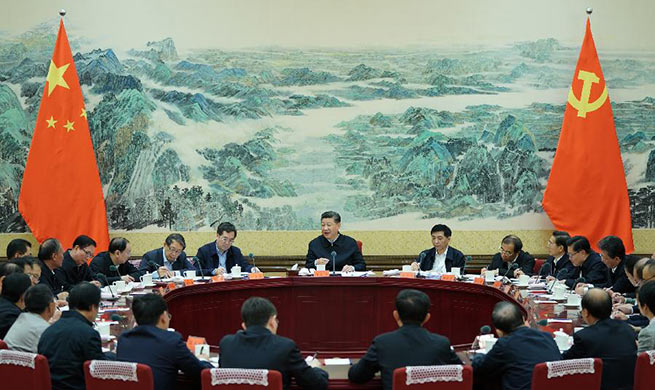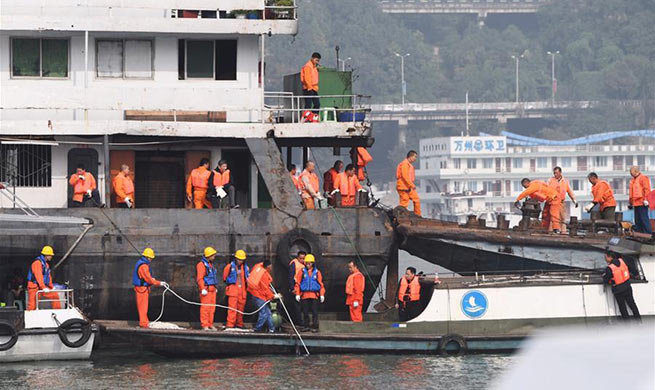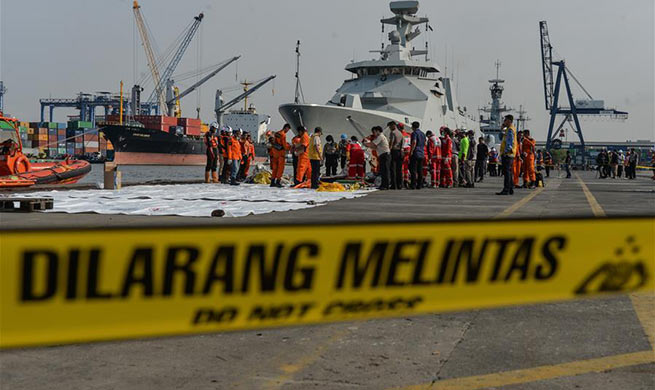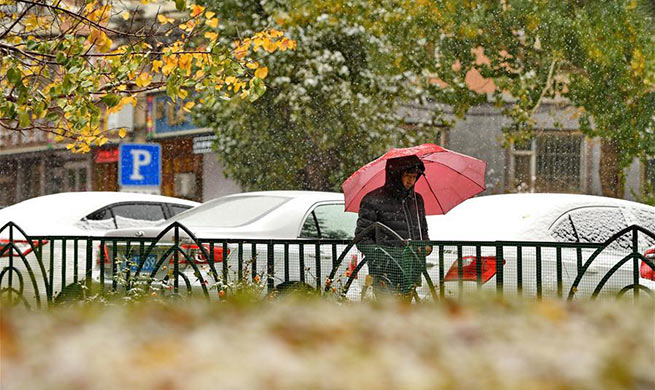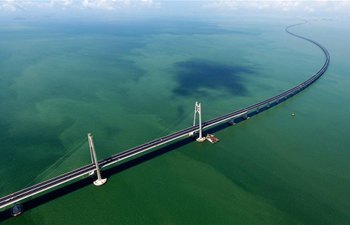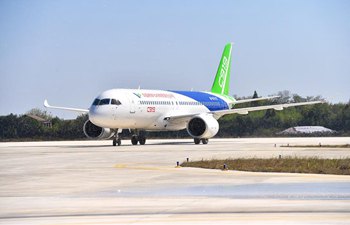By Quan Xiaoshu, Dai Ying & Yu Fei
JIUQUAN, Oct. 29 (Xinhua) -- China successfully sent an ocean-observing satellite into space on Monday, a joint mission pursued under close Sino-French space cooperation that will enable scientists to simultaneously study, for the first time, ocean surface winds and waves.
The China-France Oceanography Satellite (CFOSat), atop a Long March-2C carrier rocket, took off at 8:43 a.m. from the Jiuquan Satellite Launch Center in northwest China's Gobi Desert and entered a sun-synchronous orbit 520 km above Earth.
Jointly developed by the China National Space Administration (CNSA) and the Centre National d'Etudes Spatiales (CNES), France's space agency, the satellite will conduct 24-hour observations of global wave spectrums, effective wave height and ocean surface wind fields, said Zhao Jian, a senior official with CNSA.
INNOVATIVE TECHNOLOGIES
As the first satellite-related cooperation between China and France, the CFOSat is equipped with the world's most advanced technologies.
It carries two innovative radar instruments -- a wind scatterometer developed by China to measure the strength and direction of winds and a wave spectrometer developed by France to survey the length, height and direction of waves, according to Wang Lili, chief designer of the satellite at the China Academy of Space Technology (CAST).
"The two instruments will simultaneously help scientists collect data about winds and waves at the same location for the first time," Wang said.
Winds generate waves, and waves, in turn, modify the surface layer of the atmosphere above the ocean. Therefore, more and more often, meteorological and wave forecasts take into consideration modeling and predictions of both ocean surface winds and waves.
Related forecasts have been enhanced significantly in the last decade, but the prediction accuracy still needs to be improved, especially in extreme events, such as typhoons and rapidly evolving storms.
"The CFOSat, complementing other existing oceanography satellites, will study the dynamics of waves and how they interact with surface winds, and deepen our understanding of their formation and physical mechanism," said Zhao Jian with CNSA.
"It will help increase the observation and prediction of catastrophic sea states, such as huge waves and tropical storms, and provide security support for offshore operations and engineering, ship navigation, fisheries and coastal management.
"By gaining new insights into the impact of winds and waves on the atmosphere-ocean exchanges that play a key role in the climate system, the satellite will also provide basic information for global climate change research."
China has previously launched six oceanic satellites, with the first officially approved to be developed in 1997. Two other satellites, the HY-1C and the HY-2B, were also sent into space this year ahead of the CFOSat.
"There are now five China-developed oceanic satellites in orbit, each having its own strength in monitoring ocean color, dynamics or sea states. They will complement each other and form a comprehensive observation network to continuously cover the globe's oceans for various statistics and with high resolution," Zhao said.
"The data they acquire, of remarkable social and economic benefits, will play an important role in protecting ocean environments, exploiting marine resources, preventing and reducing marine disasters, as well as improving marine science research."
CLOSE COOPERATION
During 13 years of development, the CFOSat has helped the two research teams from China and France understand each other better.
In 2005, the Chinese and French governments signed an agreement on jointly developing an oceanography satellite and an astronomical satellite, marking the beginning of the mission.
"We have been keeping very close cooperation with our French fellows throughout the whole process, from project assessment and designing, to satellite development and testing. The cooperation will be further extended to in-orbit tests and data processing," said Wang Lili with the CAST.
Giving full consideration to the demands of the French side, the Chinese team has made modifications to the CAST2000 platform, where the satellite is based, so that it can accommodate new payloads. They effectively separate the two instruments, both working at Ku band within the microwave range of frequencies, to prevent them from interfering with each other. They also create new designs to guarantee 24-hour power supply with stronger thermal control.
However, above all technical difficulties, the biggest problem the Chinese team overcame was integrating the different standards adopted by the two countries.
"As a way out, we improved the standards for the mission so that they could meet the requirements of both sides," Wang said.
Patrick Castillan, a project manager in charge of French payloads with the CNES, said each decision was made after hard negotiation and compromise.
"We spent a lot of time at the beginning of the program trying to understand each other, as we have different standards, habits and cultures," Castillan said. "We have both learned a lot. The result is whenever we reach an agreement, it is a win-win option."
He stressed that the cooperation would continue in the collection and processing of data.
There will be five ground stations to collect the data from the satellite. Three are in China and the other two, managed by France, in Canada and Sweden.
Due to geographical limitations, the three stations in China can only collect part of the data from the satellite in relays, while the two French stations, both within the Arctic Circle, can collect all the data without break-offs.
"Our two ground stations will transfer data to both mission centers in China and in France for further processing in less than three hours," Castillan said.
"As both sides could use the data from the two instruments, we will share our software developed for the data from the wave spectrometer with the Chinese team, and they will share with us their software for the data from the wind scatterometer."
FUTURE PLANS
As a demonstration of a unique partnership between China and France in tackling climate change, the CFOSat has won support from governments of both countries.
Jean-Yves Le Gall, president of the CNES, depicted the space cooperation between the two countries as "very active", saying that another joint mission, an astronomical satellite named SVOM (Space-based multiband astronomical Variable Objects Monitor), is now under preparation and expected to launch in 2020.
With growing economic and technological strength, China has become an important space player, attracting more and more European countries to work with it in probing the universe.
In 2005, China's two space science satellites joined with the satellites of the European Space Agency to complete the world's first joint, synchronous six-point exploration of the earth's space. It was the first science satellite cooperation between China and Europe.
One of the detectors on China's Dark Matter Particle Explorer, launched in 2015, was jointly developed by scientists from China, Switzerland and Italy. China's space lab Tiangong-2, launched in 2016, carries a gamma ray polarization detector developed by scientists from China, Switzerland and Poland.
"China has always held an open attitude in space exploration and cooperation. We have signed more than 100 such cooperation agreements with more than 30 countries and over 10 international organizations," said Wu Yanhua, deputy head of the CNSA.
The coming years will see closer space cooperation between China and European countries. China's Chang'e-4 lunar probe, set to be launched in December this year and expected to become the first probe to soft-land on the far side of the moon, will carry detectors from Germany and Sweden. A Sino-European joint mission, the Solar wind Magnetosphere Ionosphere Link Explorer, will be launched in 2021.
China is also inviting all member states of the United Nations to cooperate in and jointly utilize its future space station, which is expected to be built around 2022.
The Long March-2C rocket also sent into space seven miniaturized satellites, including a science and education satellite developed by Belarus and six home-made scientific experiment satellites. Monday's launch was the 289th of the Long March rocket series.
(Zhang Quan & Hu Zhe also contributed to this story.)










